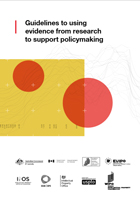New IP Economic Research Guidelines Promote Evidence-Based Policymaking
October 2, 2019
WIPO and its partners have developed a new set of guidelines to raise the quality bar for economic studies and promote awareness of the need for strong empirical research to help guide policymakers across the globe. [Video on YouTube]
The new "Guidelines to Using Evidence from Research to Policymaking" were developed during a years-long collaboration among the Chief Economists of:
- IP Australia;
- the Canadian Intellectual Property Office;
- the European Patent Office;
- the European Union Intellectual Property Office;
- the Intellectual Property Office of Singapore;
- the Swiss Federal Institute of Intellectual Property;
- the United Kingdom Intellectual Property Office; and,
- the United States Patent and Trademark Office (USPTO) and WIPO.
“These new guidelines, established by the economic research offices of a group of major IP institutions, shows commitment by WIPO and its partners to establishing a robust factual framework that can help inform decision makers everywhere,” said WIPO Director General Francis Gurry. “We hope other organizations will join us in adopting these guidelines.”
The document was publicly unveiled during the WIPO General Assemblies, with the participation of representatives of each of the participating organizations.
About the Guidelines
The guidelines cover best practices for data collection, data analysis, report clarity, validating results and drawing conclusions.
For WIPO, the new guidelines underline the Organization’s dedication to the promotion of evidence-based policymaking. WIPO’s Office of the Chief Economist produces a variety of reports that provide empirical inputs to the intellectual property (IP) and innovation policy communities. These include the Global Innovation Index, the World Intellectual Property Report series and the annual World Intellectual Property Indicators report.
WIPO also has a long-standing research program on the development dimension of IP that has generated many studies on different aspects of the IP system. And WIPO’s economists also provide analytical support to different member state committees and operational units, for example, by generating forecasts and studying how different applicants use the various international filing systems managed by WIPO.
